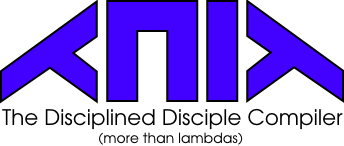Difference between revisions of "Discus"
(Moved most info to the trac.haskell.org wiki.) |
|||
| (3 intermediate revisions by the same user not shown) | |||
| Line 1: | Line 1: | ||
[[Image:Ddc-alpha1-logo.png|DDC|center]] |
[[Image:Ddc-alpha1-logo.png|DDC|center]] |
||
| − | Disciple is |
+ | Disciple is a dialect of Haskell that uses strict evaluation as the default and supports destructive update of arbitrary data structures. Disciple includes region, effect and closure typing, and this extra information provides a handle on the operational behaviour of code that isn't available in other languages. |
| + | Programs can be written in either a pure/functional or effecful/imperative style, and one of our goals is to provide both styles coherently in the same language. The two styles can be mixed safely, for example: when using laziness the type system guarantees that computations with visible side effects are not suspended. Many Haskell programs are also Disciple programs, or will run with minor changes. |
||
| − | == The Disciplined Disciple Compiler == |
||
| + | |||
| − | * Uses a typed core language which includes effect, closure, region and mutability information. |
||
| + | DDC is still in the "research prototype" stage, meaning that it will compile programs if you are nice to it, but expect compiler panics and missing features. You'll get panics due to ungraceful handling of errors in the source code, but valid programs should compile ok. |
||
| − | * This extended type information is used to allow code-transformation style optimizations in the presence of side effects and mutable objects. |
||
| − | * Compiles via standard C99, so is highly portable. |
||
| − | * Tested on linux-{x86, x86_64} and darwin-{x86, x86_64} (tested on 10.5.4) |
||
| − | * Is an active research project and not yet "industrial strength", but will compile some programs if you're nice to it. |
||
== More Information == |
== More Information == |
||
| − | * Please see |
+ | * Please see http://disciple.ouroborus.net for further information. |
| − | * If you've tripped over a bug then please add a [http://trac.haskell.org/ddc/newticket New Ticket]. |
||
* You can also post in http://groups.google.com/group/disciple-cafe. |
* You can also post in http://groups.google.com/group/disciple-cafe. |
||
* Or ask in #disciplined on irc.freenode.net |
* Or ask in #disciplined on irc.freenode.net |
||
Revision as of 12:33, 3 December 2010
Disciple is a dialect of Haskell that uses strict evaluation as the default and supports destructive update of arbitrary data structures. Disciple includes region, effect and closure typing, and this extra information provides a handle on the operational behaviour of code that isn't available in other languages.
Programs can be written in either a pure/functional or effecful/imperative style, and one of our goals is to provide both styles coherently in the same language. The two styles can be mixed safely, for example: when using laziness the type system guarantees that computations with visible side effects are not suspended. Many Haskell programs are also Disciple programs, or will run with minor changes.
DDC is still in the "research prototype" stage, meaning that it will compile programs if you are nice to it, but expect compiler panics and missing features. You'll get panics due to ungraceful handling of errors in the source code, but valid programs should compile ok.
More Information
- Please see http://disciple.ouroborus.net for further information.
- You can also post in http://groups.google.com/group/disciple-cafe.
- Or ask in #disciplined on irc.freenode.net
